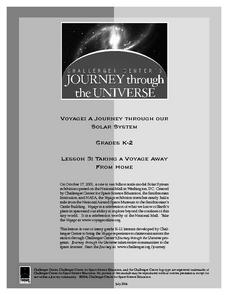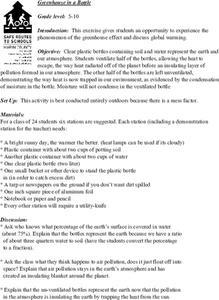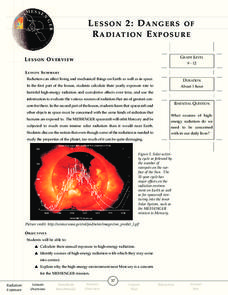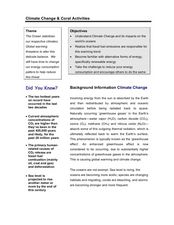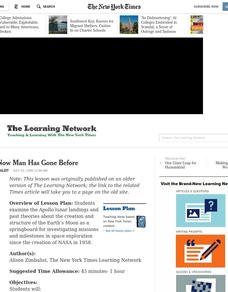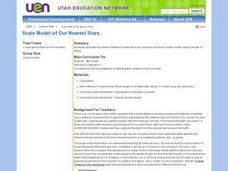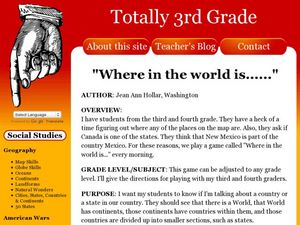Curated OER
Living On The Moon
Students evaluate what life would be like living on the moon or another planet in our solar system. In this science lesson, students create a colony that they would use to live in on the moon using Legos.
Curated OER
The Sun in Our Lives
Third graders identify the different parts of the sun. In this astronomy lesson plan, 3rd graders examine how the sun's energy drive life processes on Earth. They construct a model of a solar system using large rolls of toilet paper.
Curated OER
How Much Water is There?
Students investigate the amount of fresh water on earth and which water can be used for consumption. In this fresh water lesson plan, students calculate the amount of fresh water that can be used for consumption on earth. They use a 5...
Curated OER
Astronomy Merit Badge
Young scholars explore astronomy through the Starry Night Constellation Adventure software. They print star charts and identify constellations. They sketch the Big Dipper and describe the Milky Way. They list the five most visible...
Curated OER
Taking a Voyage away from Home
Students experience and participate in a journey through a "Voyage" exhibition of the Solar System and the frontier it covers. They build a dynamic model of the Earth and Sun. Descriptions are given on the relative sizes of the Sun and...
Curated OER
Star Circles
In this star circles worksheet, students solve six problems given a diagram of a time-exposure photograph of the stars. Students determine the scale of the image, the location of the North Celestial Pole, they identify Polaris and they...
Curated OER
Round and Round-The Water Cycle
Students explore the water cycle. In this earth science lesson, students work in small groups to read various books on the water cycle and take notes on chart paper. Students share their notes and teach a younger audience what they have...
Curated OER
Landforms in a Tub
Fifth graders use common household items to build landforms and simulate weathering and erosion.
Curated OER
Demonstrating the Distances of Stars
Students examine the distance from Earth to stars. They create a model to show the arrangement of constellations. They also identify the importance of the parallax effect.
Curated OER
Lunar Lollipops
Middle schoolers simulate the phases of the moon using a lamp and styrofoam balls. In this lunar phases lesson, students stand around a lamp and act as Earth. They hold styrofoam balls and rotate to show the phases of the moon.
Curated OER
Greenhouse in a Bottle
Students create models of the greenhouse effect using recycled 2-liter bottles. They discuss how their models compares to the real greenhouse effect the earth experiences.
Curated OER
Stream Ecology In Wisconsin and Puerto Rico
Students identify the different types of water and explain in what proportions they exist on Earth. They identify and correctly label the parts of the water cycle and how these parts interact with each other. Students identify the...
Curated OER
Dangers Of Radiation Exposure
Students investigate the effects of radiation exposure and how it can effect objects on earth and space. They conduct research using a variety of resources and use the information to create a project that is reflective of good research...
Curated OER
The Climate Change Skeptic's Argument: Natural Solar Cycles or Human Activity?
Teachers explore patterns in sunspots and total solar irradiance to understand the counterpoint to the human effect of global warming. In this professional development tool, teachers work through a lesson on the sun's natural patterns to...
Curated OER
Climate Change & Coral Activities
Students study how the ocean stabilizes our planet's climates and how global warming is becoming a threat to this fine balance. In this climate change instructional activity, students identify that fossil fuel emissions are responsible...
Curated OER
Water: Our Most Important Beverage
Third graders create a KWL chart about water. In this environmental science instructional activity, 3rd graders demonstrate how much water on Earth is usable. They act out the different stages of the water cycle.
Curated OER
Where Now Man Has Gone Before
Students examine the Apollo lunar landings and past theories about the creation and structure of the Earth's Moon as a springboard for investigating missions and milestones in space exploration since the creation of NASA in 1958.
Curated OER
Scale Model of Our Nearest Stars
Sixth graders calculate a light day, light hour, and light minute from the standard of a light year. After establishing the distances, a one meter scale is created to demonstrate the distance between the sun and the planets of our solar...
Curated OER
Where in the World is...?
Students work in groups to locate an appropriate planet where inhabitants of a fictional place can be relocated. They create a PowerPoint presentation to introduce their relocation site, as well as ecosystem information about the site....
Curated OER
Water Conservation
Students explore types of water reserves. In this water conservation instructional activity, students brainstorm ways water are used in their homes. Students use a graduated cylinder to simulate the amount of water on Earth and the...
Curated OER
The Energy Grab Game
Eighth graders explore the scarcity of energy resources. They also explore the competition for natural resources and the inadequate distribution of natural wealth among the Earth's nations.
Curated OER
Dinosaurs Here Yesterday Gone Today
Students take a pre-test to show their prior knowledge of dinosaurs. Using the internet, they reasearch the time period in which they roamed the Earth. Focusing on the area of Connecticut, they compare and contrast the large and small...
Curated OER
Importance of Water
Students complete a KWL chart on what they comprehend about water. They complete a water activity determining how much usable water is available, and they determine the water usage in their households. Students take notes on water and...
Curated OER
Time Zones
For this time zones worksheet, students are given a map of the Earth indicating the time zones, the prime meridian and the international date line. Students answer 5 questions about solar occurrences and determine when each would be seen...
Other popular searches
- Planet Earth Dvd Series
- Planet Earth and Bbc
- Planet Earth Seasons
- Planet Earth and Beyond
- Bbc's Planet Earth
- Planet Earth Dvd
- Bbc Planet Earth
- Planet Earth Ocean
- Extreme Planet Earth
- Planet Earth Great Plains
- The Planet Earth
- Planet Earth Jungles






